#aaron oberon
Explore tagged Tumblr posts
Text
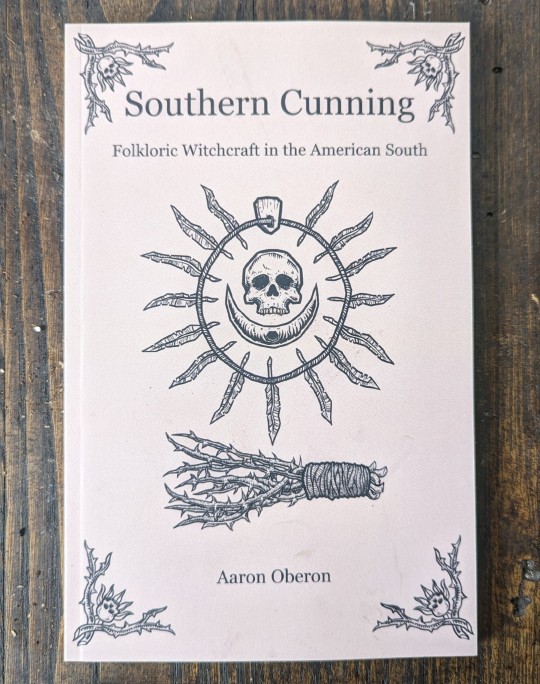
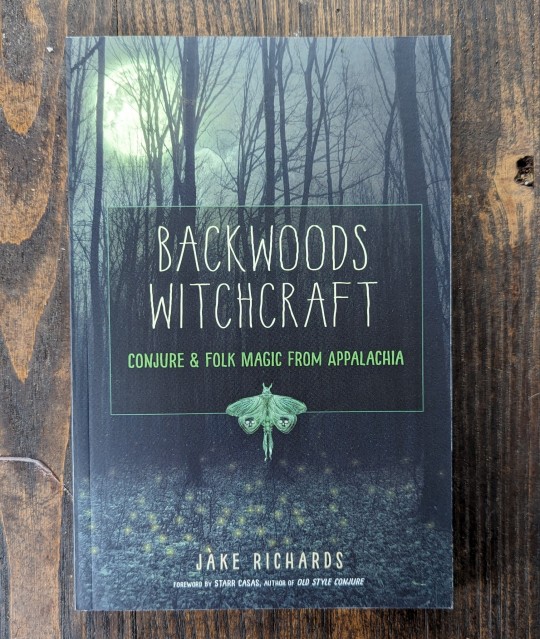
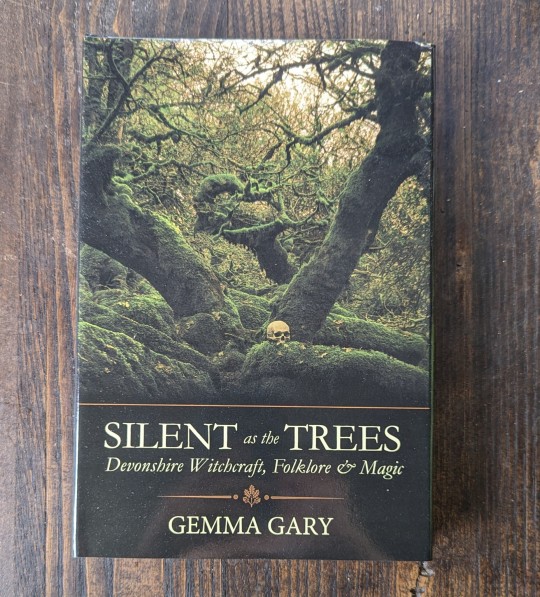
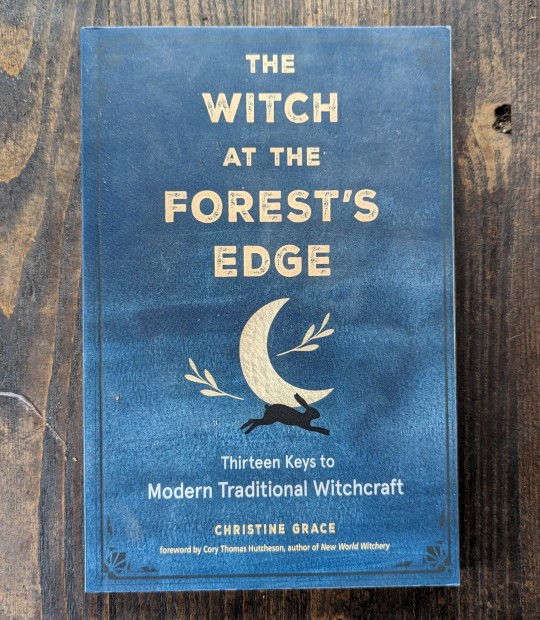
RESTOCKS!
Southern Cunning: Folkloric Witchcraft in the American South by Aaron Oberon
Backwoods Witchcraft: Conjure & Folklore from Appalachia by Jake Richards
Silent as the Trees: Devonshire Witchcraft, Folklore & Magic by Gemma Gary
The Witch at the Forest's Edge: Thirteen Keys to Modern Traditional Witchcraft by Christine Grace
#traditional witchcraft#modern traditional witchcraft#folkloric witchcraft#folk magic#folk witchcraft#witchblr#southern cunning#cunningfolk#silent as the trees#backwoods witchcraft#witch community#witchcraft#witchcraft books#pagan books#genna gary#jake richardson#aaron oberon
46 notes
·
View notes
Text

let's get into it
#southern cunning#witchblr#witchcraft#witch#witchy#magic#spellcraft#spellwork#witches of tumblr#aaron oberon#ad-caelestia
18 notes
·
View notes
Text
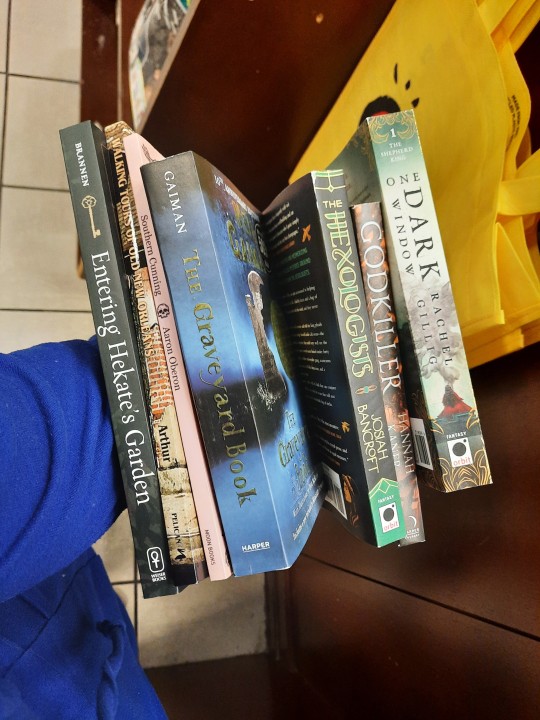
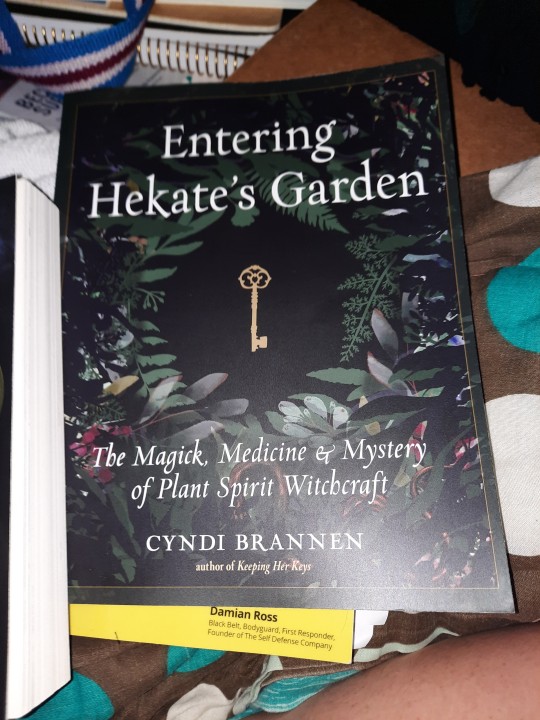
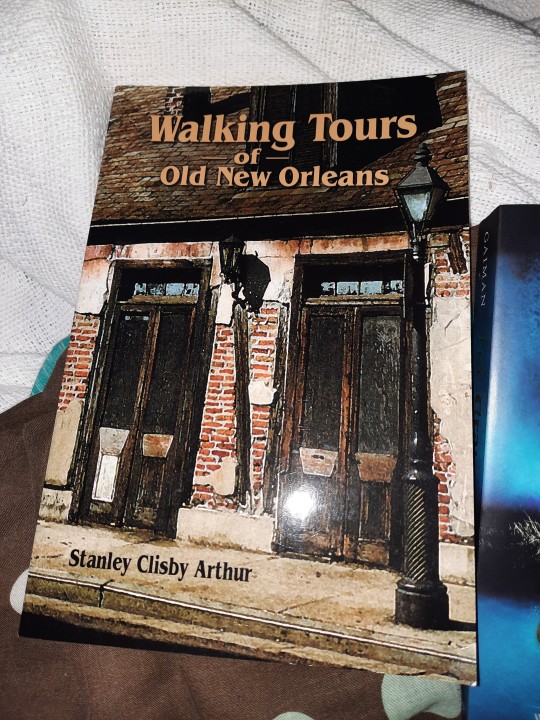

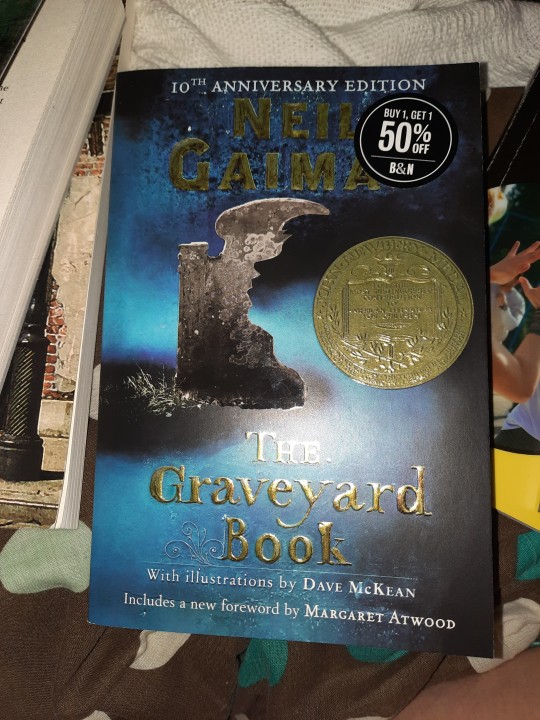
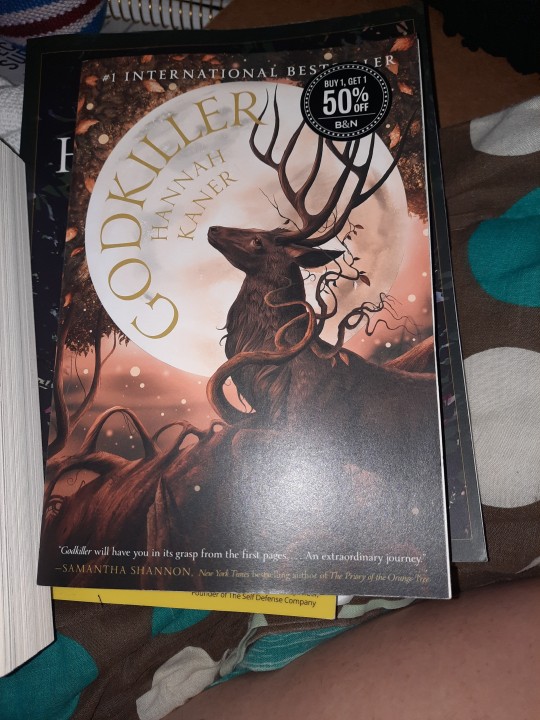
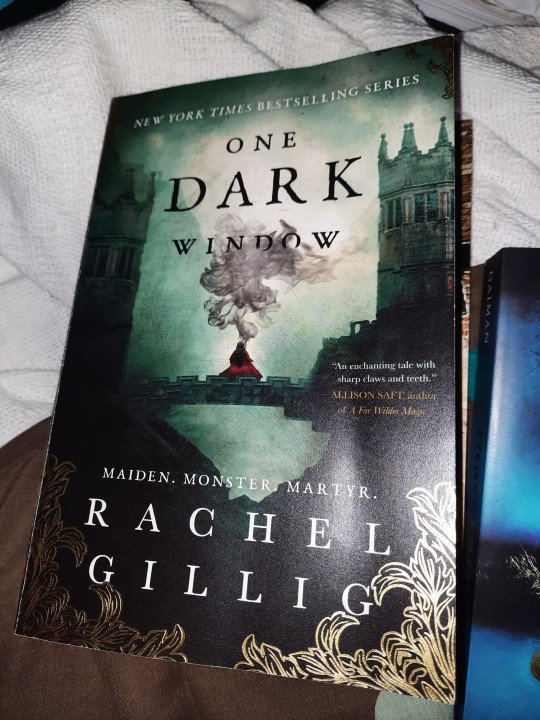
book haul book haul 📚 🎉
they were on sale i swear
Okay, I did spend a bit more than I should have -coughs- But I need them all.
Okay, genuinely, re: the fiction books, I was just gonna grab The Graveyard Book because I've wanted it for a while - I mean, it's Neil Gaiman, come on - and it was on sale plus the buy one get one half off, but obviously that meant I had to grab another book and I couldn't decide between two but I couldn't just get three and... Yeah.
But seriously I've been so burnt out I'm getting crispy. ❤️🔥 🔥 I haven't had the brain 🧠 to do the things I need to do because I'm exhausted and I'm so friggin exhausted because I haven't been letting myself actually rest by doing the fun things. So. Fiction.
and it worked. I absolutely devoured One Dark Window in a day; it was great. The second book is supposed to get here tomorrow; it was cheaper on Amazon.
The nonfiction books are useful. Entering Hekate's Garden was definitely the most expensive but it didn't have the price on it and by the time I got up to the counter and found out, I was like fuckit because it's been on my wishlist for so long now.
I am liking Southern Cunning so far but I'm not very far in so we shall see.
Guess what my mother did the same day I got these? Yeah she did the exact same thing. I showed off the books because I knew we had the same taste and she'd be interested in the ones I got. I was not expecting her to also have bought The Hexologists. smh, go figure.
So I ran back real quick and switched it out for a sequel to another fiction book she'd gotten prior that was also on the buy one get one half off table. I don't remember the title and I didn't get a picture of it. I think the first book was called Her Royal Majesty's Coven and the second was the something cabinet.
#the graveyard book#neil gaiman#the hexologists#one dark window#rachel gillig#books and reading#books#fiction#dark fantasy#fantasy#godkiller#southern cunning#southern culture#folkloric witchcraft#witchcraft#southern witch#new orleans#walking tours of new orleans#Hekate#entering hekate's garden#aaron oberon#book review#book recommendations#bookblr#book reccs#book rec list#self care#self love#books are life#books are magic
3 notes
·
View notes
Text
Genie (2023) Review
When Bernard is about to lose everything due to his workoholic nature, he must enlist the help of a magical genie named Flora to help win his family back before Christmas. ⭐️⭐️ Continue reading Untitled
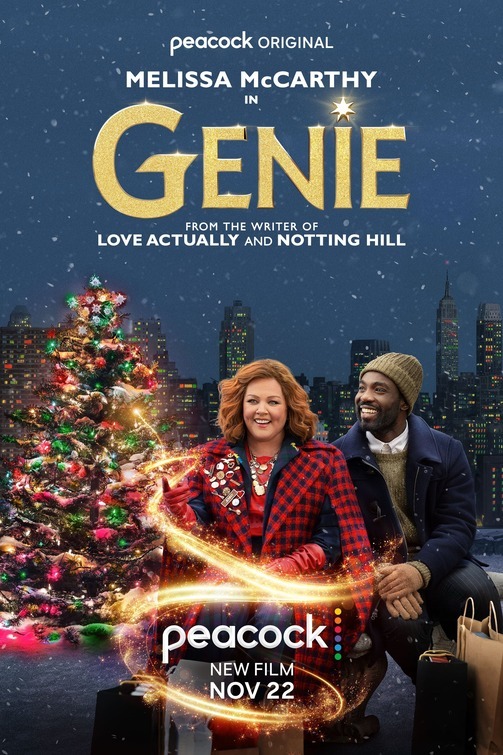
View On WordPress
#2023#Aaron Berg#Alan Cumming#Cheesy Christmas Film#Christmas#Comedy#Denee Benton#Ego Nwodim#Ellen Cleghorne#Emanuele Secci#Fantasy#Genie#John Reynolds#Jordyn McIntosh#LaChanze#Luis Guzman#Marc Maron#Melissa McCarthy#Nyasha Hatendi#Oberon K.A. Adjepong#Paapa Essiedu#Ralph Brown#Review#Richard Curtis#Sam Boyd#Savino LaQuale#Sky Cinema#Tate Ellington
0 notes
Text
Occult/Magical Books I Read This Year That I Actually Kinda Recommend
Information about these various books can be found in the reading wrap up tag of this blog by going to the month I read them in. We have two 10 out of 10 books, one 9 out of 10 books, and six 7 or 8 out of 10 books.
I read far more occult/magic books than this for this year, but I don't actually recommend most of them.
10/10 Category
Welsh Witchcraft: A Guide to the Spirits, Lore, and Magic of Wales | Mhara Starling
Sacred Gender: Create Trans and Nonbinary Spiritual Connections | Ariana Serpentine
9/10 Category
Warrior Magic: Justice Spirituality and Culture from Around the World | Tomas Prower
7-8/10 Category
Spells for Change: A Guide for Modern Witches | Frankie Castanea
Condensed Chaos: An Introduction to Chaos Magic | Phil Hine
Magickal Servitors: Create Your Own Spirits to Attract Pleasure, Power and Prosperity | Damon Brand
Southern Cunning: Folkloric Witchcraft in the American South | Aaron Oberon
Outside the Charmed Circle: Exploring Gender & Sexuality in Magical Practice | Misha Magdalene
Bending the Binary: Polarity Magic in a Nonbinary World | Deborah Lipp (NOTE: the author is a cis woman, and it's a little obvious, but compared to the bigots I deal with regularly, she's still doing pretty good)
131 notes
·
View notes
Text
Best Character Named X Poll
I'm doing a series of "Best Character Named X" polls where all the characters have the same first name but are from completely different media, feel free to send in name/charcacter suggestions, I'm posting one poll a day. New polls scheduled for 1:30PM GMT everyday.
If your favourite character is not included in the poll very sorry i have either never heard of them or actively chose not to include them as theres only 6 characters per poll. Characters will only count of that is their first name, surnames do not count. Official characters in canon only, please do not submit OCs.
Round 464: Trixie
Round 465: Puck
Round 466: Sally
Round 467: Joseph
Round 468: Bridget
Round 469: Jamie
Round 470: Selina
Past Polls
Poll Ideas under the cut
Names that I have a complete list for*
Tam, Delilah, Katya, Minerva, Ebony, Miriam, Bianca, Amara, Cleo, August, Kendra, Aurora, Ramona, Orion, Kala, Madeline, Kit, Marian, Lena, Cora, Irene, Hilda, Valentine, Marissa, Hope, Oberon, Stella, Lenore, Wanda, Winona, Una, Marnie, Mirabel, Olympia, Chip, Bo, Rue, Leslie, Delia, Richter, Harley, Blue, Apollo, Celeste, Melody, Pauline, Darcy, Red, Tsukasa, Ella, Orlando, Yukari, Tanya, Briar, Akira, Irma, Marlene, Harriet, Letitia, Koichi, Carina, Yuki, Callie, Dee, Freya, Sasha, Zain, Edith, Candy, Richter, Melissa
Names I have an incomplete list for (welcome to send character suggestions)
Yasmin, Chase, Rudolf, Melvin, Adele, Adeline, Jem, Dolores, Jude, Bellamy, Reese, Nemo, Addison, Adelaide, Candace, Abraham, Ragnar, Destiny, Hero, Drew, Wallace, Jean (feminine), Cheryl, Shane, Tegan, Matthias, Liam, Ellis, Dennis, Josie, Mike, Bailey, Eden, Giselle, Suki, Keith, Wilfred, Blaine, Pam, Brianna, Sabine, Roman, Kalina, Mindy, Monet, Zara, Marcus, Elias, Mira, Glen, Farah, Faith, Enid, Ross, Antoinette, Elodie, Mallory, Kay, Renee, Willow, Albert, Howard, Oswald, Clem, Jace, Howell, Rowan, José, Christian, Ravi, Dev, Valerie, Norma, Tristan, Jolene, Yumi, Sakura, Carol, Carrie, Casper, Septimus, Rosalind, Rosamund, Rosie, Rosa, Gerald, Geraldine, Gerard, Ariel, Ariadne, Anya, Ida, Rocky, Mal, Solomon, Sol, Vera, Vincent, Nolan, Sage, Jojo, Calliope, Roxy, Roxanne, Silver, Noel, Noelle, Stacy, Lloyd, Alba, Virginia, Eva, Amos, Petra, Marla, Dante, Gretchen, Rhydian, Russ, Tate, Tatum, Morris, Ambrose, Doug, Grant, Graham, Aaron, Ivan, Paris, Doris, Rain, Sora, Wayne, Helga, Garth, Constantine, Sonny, Courtney, Jamal, Niall, Cecil, Cecilia, Cat, Katherine, Ophelia, Laurie, Lori, Bernadette, Lauren, Angela, Angelina, Angelica, Janine, Austin, Niles, Catriona, Katarina, Octavia, Octavius, Octavian
Feel free to send more suggestions
*subject to change, you can still submit a character if there is no strikethrough if you think theres a character that its an absolute crime i dont add. Please don't suggest anything for the names with a strikethrough as they are polls that are already in my queue waiting to be published.
38 notes
·
View notes
Text
Fancasting the Giffen-DeMatteis-Maguire era Justice League International in the DCU
It's Bwa-ha-ha time. Basically every character who hasn't been cast yet (i.e. everyone except Guy Gardner and Booster Gold, who I've assumed is set to be played by Kumail Nanjiani).
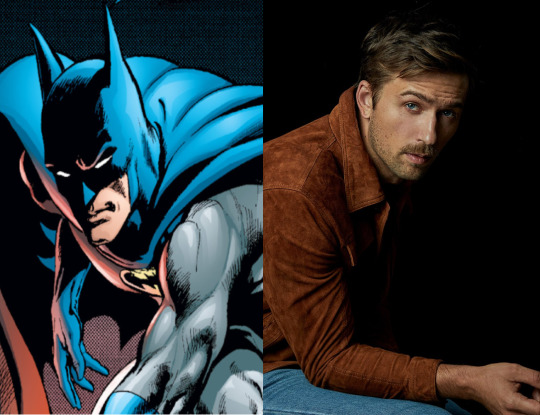
Brandon Sklenar (1923, Midway, It Ends With Us) as Bruce Wayne/Batman
-Can Pull off "Certified Hunk" -Looks great in a suit -Isn't just "stern guy with deep voice" -Build is near-perfect. built & muscular, but not too wide. -Fairly reasonable age to be handling Damien & rest of Bat-Family.
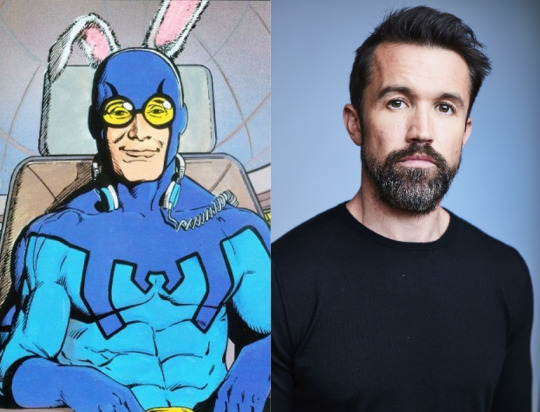
Rob McElhenney(It's Always Sunny In Philladelphia, Mythic Quest) as Ted Kord/Blue Beetle II
-Can play dorky, fed up, and "IQ lowered when around a certain person" -Other than that, pretty big range, great with physical performance. -Similar age to Kumail Nanjiani, who I've accepted is playing Booster. -Can basically play any body type.
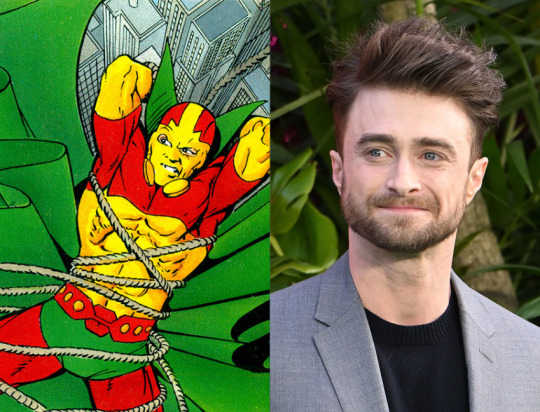
Daniel Radcliffe(Swiss Army Man, Weird: The Al Yankovic Story) as Scott Free/Mister Miracle
-Incredible range, could play any version of the character, Kirby, King, whatever -Leaning towards the King interpretation, can still look great disheveled. -Relatively short, would make whoever plays Barda look bigger by comparison.
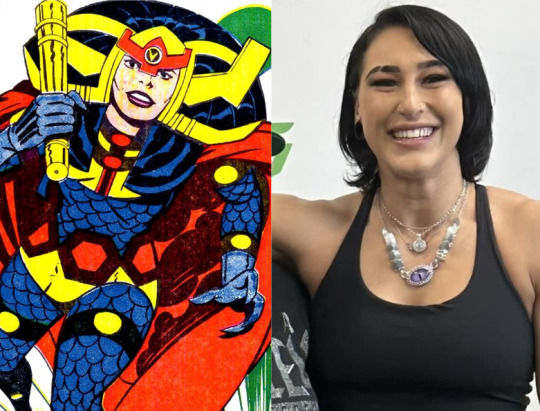
Demi "Rhea Ripley" Bennet(WWE) as Barda Free/Big Barda OKAY HEAR ME OUT HEAR ME OUT -She can play big and intimidating. -Also shows decent amount of emotion in sparse moments during performances/in interviews. -Built perfectly, toned body, with broad shoulders. -Has potential to be next great wrestler-turned actress, in the vein of Dave Bautista and John Cena.
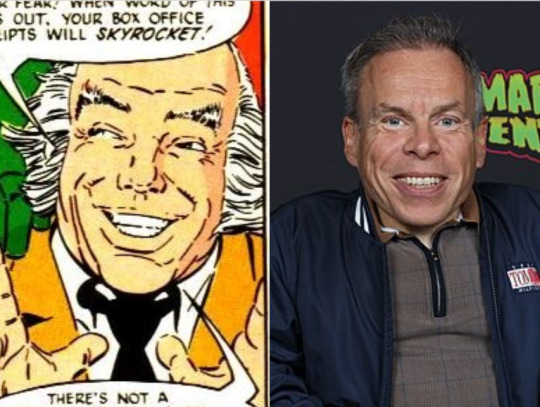
Warwick Davis(Return of the Jedi, Willow, Life's Too Short) as Oberon Kurtzberg
-Decent range, able to go toe to toe with Val Kilmer in Willow. -Able to be funnier than one might expect, see Life's Too Short. -Aside from the hair, he's the spitting image of Oberon as drawn by Kevin Maguire.
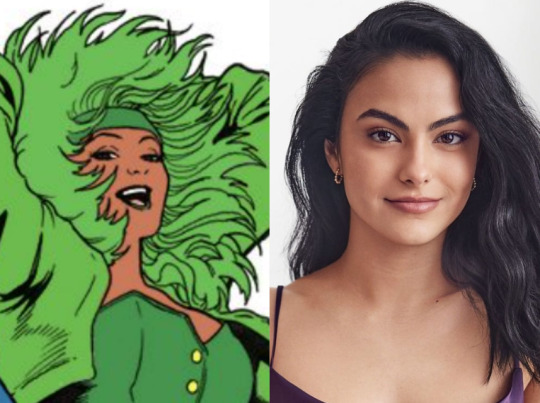
Camila Mendes(Riverdale, Do Revenge, Palm Springs) as Beatriz DaCosta/Fire.
-Shows great amount of potential as an actress -Can play the kind of endearing, charming, fun, and slightly airheaded personality that I want for fire very easily. -Is of Brazilian descent. -Has experience with goofy/comic book-y plots.

Ulrikke Falch(Skam/Shame) as Tora Olafsdotter/Ice
-Can nail the girl-next-door, yet also extremely sincere energy I would like Ice to have. -Is a Norwegian actress who can speak perfect english. -Is of similar age to my pick for Fire. -Is just an overall well-educated and smart person, in addition to being a fantastic performer.
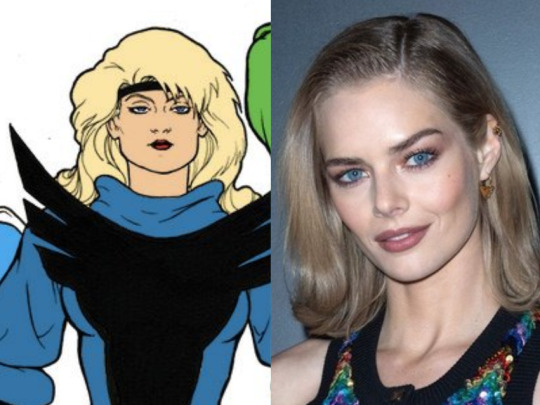
Samara Weaving(Ready or Not, Scream VI, Bill and Ted Face The Music) as Dinah Drake Lance/Black Canary II -Can play just really done with everything, as in JLI -Spectacular at deadpan comedy. -Can kick serious ass -Has a killer scream
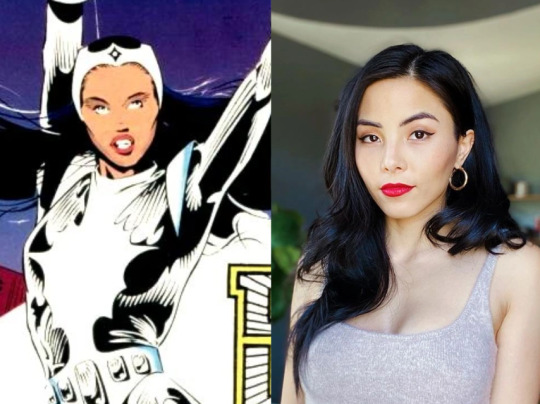
Anna Akana(Amphibia, Wrestling isn't Wrestling) as Kimiyo Hoshi/Doctor Light II -Her work on Matt Braly's Amphibia shows an impressive range, from dramatic to comedic, something she excels at. -Can play that kind of overly-driven, borderline arrogant personality seen in Crisis on Infinite Earths.
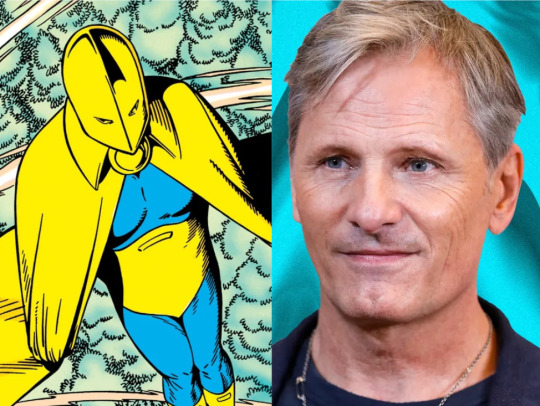
Viggo Mortensen(The Lord of the Rings, Eastern Promises, A History of Violence) as Kent Nelson/Doctor Fate I
-Has that kind of Gravitas/Prestige needed to bring Doctor Fate to life -Can play that kind of cold/borderline nihilistic vibe Kent had in Ram V's JLD run,
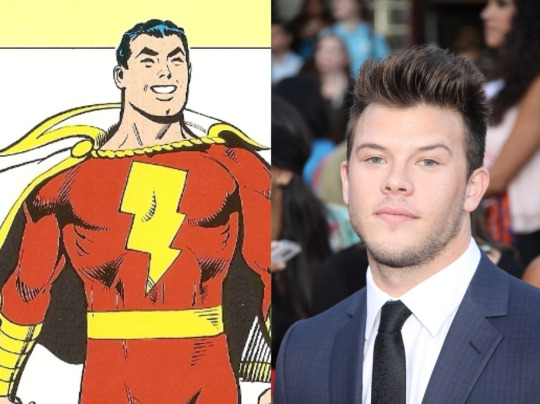
Jimmy Tatro(22 Jump Street, American Vandal, Theater Camp) as Captain Marvel/Shazam -Has the kind of Childlike Himbo sort of energy, as seen in 22 Jump Street & American Vandal, that works real well for Captain Marvel/Shazam. -Also shows decent amount of emotional range, not just comedic, in American Vandal
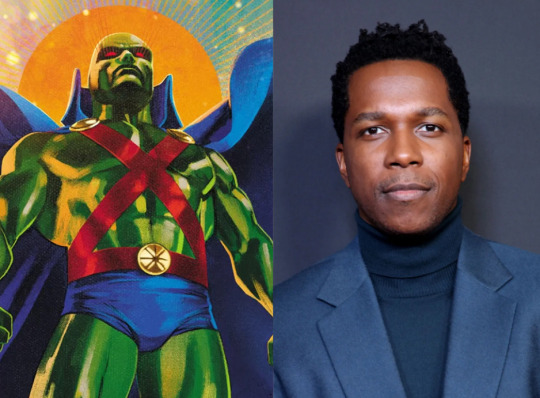
Leslie Odom, Jr.(Hamilton, Glass Onion, Murder on the Orient Express, One Night In Miami) as J'onn J'onzz/John Jones/Martian Manhunter. -Has the chops. Odom, Jr. is one of the most electric performers in recent memory. -Performance as Aaron Burr in Hamilton (specifically in "The Election of 1800) proves he can pull off the Cooke-esque "Corny as a comic book" performative nature of John Jones. -Could also nail that betrayed look that MM had in New Frontier after hearing about John Wilson's death. And that's it. Not totally confident with some of these choices, but if these performers become the lineup for the JLI, I think we'll get some great portrayals of these beloved characters. Let me know if you think I'm on to something or if I should just shut up already.
#dc comics#dcu#fancast#justice league international#jli#batman#ted kord#blue beetle#mister miracle#big barda#oberon#fire dc#ice dc#beatriz da costa#tora olafsdotter#black canary#dinah lance#kimiyo hoshi#doctor fate#kent nelson#shazam#captain marvel dc#j'onn j'onzz#martian manhunter#brandon sklenar#rob mcelhenney#daniel radcliffe#demi bennett#rhea ripley#warwick davis
12 notes
·
View notes
Text
American Witch Balls
aka Witch Bullets

Friday the 13th is often thought of as bad luck. So much so that it has become associated with witches in some parts of the United States. This is the day when witches in folklore would make witch balls, balls of hair that would curse people and livestock. Let’s dive into this bit of folkloric witchcraft.
⊹ ۪ 𖥔 ˑ ִ ֗ ִ ۫ ˑ𖦹☆.𓋼𓍊 𓆏 𓍊𓋼𓍊.☆𖦹⊹ ۪ 𖥔 ˑ ִ ֗ ִ ۫ ˑ
Contents:
History
How to
Conclusion
⊹ ۪ 𖥔 ˑ ִ ֗ ִ ۫ ˑ𖦹☆.𓋼𓍊 𓆏 𓍊𓋼𓍊.☆𖦹⊹ ۪ 𖥔 ˑ ִ ֗ ִ ۫ ˑ
History
“To this mystic myrrh, To make a witch ball, I, the Devil, doth stir, To place curses on one and all.”
This is what the devil chants as the coven gathers on Friday the 13th in “How to Make Witch Balls” from Hubert Davis’ “The Silver Bullet and Other American Witch Stories.” These hairballs are unique to North America, having only the name in common with their UK counterparts. From Pennsylvania to Iowa, people believed that if their animal died and was found with a ball of hair inside, they had been cursed by a witch. So much so that there are newspaper articles detailing trials where people accused one another of using them from the late 19th century.
Not all hairballs were thought of as cursing, as some were employed by conjure persons and witch doctors for healing. Usually the ones thought to curse were found in humans and domesticated animals. If they were made from the hair of a deer, for example, they were thought to have healing properties. Similar to a bezoar.
Around the turn of the 20th century, doctors began to debunk witch balls as simple hairballs animals were unable to digest, coming from licking themselves or other animals. Still, these beliefs persist and we can employ the idea in our own craft.
⊹ ۪ 𖥔 ˑ ִ ֗ ִ ۫ ˑ𖦹☆.𓋼𓍊 𓆏 𓍊𓋼𓍊.☆𖦹⊹ ۪ 𖥔 ˑ ִ ֗ ִ ۫ ˑ
How To
The most important parts of the witch ball are the hair (usually from a black dog, cat, cow, or horse) and the beeswax. The folktale includes several gruesome ingredients from the benign spiders legs to a dead baby’s toe. For our version we will not be requiring the desecration of bodies. If you already have favorite baneful herbs you can add those to your mix, otherwise I suggest things such as graveyard dirt, hot pepper flakes, a nightshade if you’re comfortable working with poisonous plants, and maybe those spiders legs if you can find a dead one.
Once you have the hair, the wax, and anything else you would like to add, we can get started. Set the wax to melt on a double boiler. Personally I put a pot to boil and put a smaller pot in the water for a makeshift double boiler. Add in your extra ingredients, telling them their jobs as you do, and as you stir chant the devil's chant above. Roll the animal hair into a ball and cover it in the wax to hold shape. Once cool, take your own hair and tie it around the ball. You now have a witch bullet ready to deploy in whatever way you can imagine.
⊹ ۪ 𖥔 ˑ ִ ֗ ִ ۫ ˑ𖦹☆.𓋼𓍊 𓆏 𓍊𓋼𓍊.☆𖦹⊹ ۪ 𖥔 ˑ ִ ֗ ִ ۫ ˑ
Conclusion
Hairballs may be the last thing you expected to be associated with witchcraft. Making witch bullets on Friday the 13th has become a key part of my practice. I think of curses the same way I think about martial arts; good to know how to do, hope you never have to. I have to wonder, do other witches have practices specific to the 13th?
References:
America Bewitched by Owen Davies
The Danger of Hairballs by the Cornell University’s College of Veterinary Medicine
The Witch's Bullet: Hairball and Hexing Tradition by Via Hedera
Southern Cunning by Aaron Oberon
#witchblr#witchcraft#traditional witchcraft#american folkloric witchcraft#folkloric witchcraft#witch balls#witch bullets#trad craft#curse#baneful magic#spellwork#Friday the 13th
16 notes
·
View notes
Note
Is traditional witchcraft the same as folk magic?
I'd say they are not the same, but they have some similarities. I think it is important to keep in mind that while there are some general things people agree on when it coming to defining traditional witchcraft and folk magic, everybody is going to have a different perspective of what encompasses these practices. It's kinda up to you to figure out your own perspective.
One book I have, "Southern Cunning" by Aaron Oberon, defines traditional witchcraft as two different things: "Traditional Witchcraft [emphasis on the capital T and W] is lineaged non-Wiccan witchcraft. Traditional Witchcraft often includes a coven structure and very specific ritual techniques that vary little between person to person. Conversely, traditional witchcraft [emphasis on the lowercase t and w] refers to non-lineaged, non-Wiccan witchcraft that draws on history, folklore, and bioregionalism influences."
Keep in mind, his reasoning for the emphasis on capital and lowercase t's and w's is to provide better insight on his descriptions later in the book. He also is very upfront that not everybody may agreed with these two definitions, and that is okay.
He further goes to define folk magic, or folkloric witchcraft, as focusing primarily on local folklore, ancestral traditions, and bioregionalism to inform the person's witchcraft. Both folkloric and traditional witchcraft [emphasis on the lowercase t and w] are individualized practices, often lacking any kind of coven or group structure and has high amounts of variety between practitioners who claim the term.
Again, just because I know there are going to be vocabulary police reading this somewhere, the author that wrote these definitions was very upfront about these definitions not being universally agreed upon and that they are broken down the way they are for the sake of the reader being able to better understand the rest of his book.
I'd say that I generally agree with these definitions, with specific focus on how he defines traditional witchcraft as witchcraft that draws on history, folklore, and bioregionalism influences and folk magic/folkloric witchcraft as focusing primarily on local folklore, ancestral traditions and bioregionalism.
Now, anything can become traditional. Anything, anywhere. You could easily narrow down traditional witchcraft by country, though from what I have observed many tend to blend traditional practices from varying countries. That is why there is emphasis on history, folklore and bioregionalism. It really depends on who you're talking to, though.
Folk magic is inherently traditional, but more in the "your granny did this and now you do it" way and not the "these are practices that have been documented over the centuries and we should use/learn from them" way. You don't nesecarrily need any living relatives to practice folk magic in order to learn it, but folk magic does require you to connect with other practitioners at some point to learn. Especially if you are intending to reconnect with ancestral traditions from your ancestor's countries (for example, an American trying to reconnect with their German ancestry and ancestral traditions). This is where the emphasis on local folklore, ancestral traditions, and bioregionalism is important.
I hope this made sense. It's a sorta complicated topic.
96 notes
·
View notes
Text
Going to the library to look for books, anyone got witch book recommendations?
I really like these books so far:
Southern Cunning, Folkloric Witchcraft in the American South by Aaron Oberon
Three Books of Occult Philosophy by Henry Cornelius Agrippa
Faries, a Guide to the Celtic Fair Folk, by Morgan Daimler
Any books on folklore of witchcraft, working with spirits like the fae, dragons, the dead, ect. (any supernatural creature really), books on herbal medicines/poisons and how to make things with plants, or just really old books on magic, books on alchemy would also be cool. Anyone know any books?
I find it really hard to find books that aren't filled with new age crap and tell me something i don't already know. If anyone has any recs it would REALLY help me out. These 3 books and any book by @breelandwalker are the only witch books i would really recommend to people. After 6+ years of having an official craft these are the only books i actually deem good. Its sooo hard to find good ones.
26 notes
·
View notes
Text
REVIEW: Old Style Conjure by Starr Casas
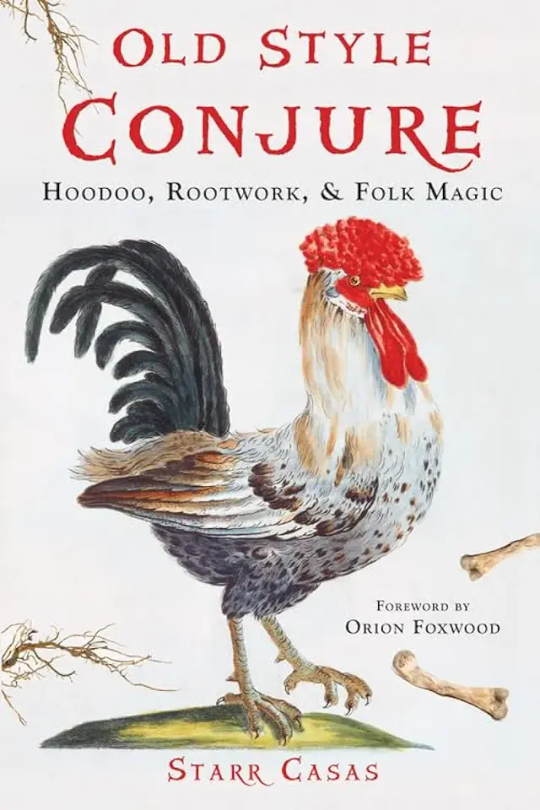
There's some controversy around this book, mostly because Starr Casas is a white woman writing about hoodoo. (Or at least white passing -- Casas does not disclose her ancestry in this book, and I never want to assume based on appearances. Some of the memoir content in this book makes me think she may be from a mixed family.) I avoided this book for a long time because of that controversy, so I want to address it before I move into pros and cons.
When people accuse Casas of cultural appropriation, if they're not talking about her appearance they'll typically bring up this line from a FAQ section in this book: "Q. Can white folks do conjure work? Yes, they can, as long as they honor the ancestors of this work. Those ancestors are the folks who were kidnapped and sold into slavery. They brought this work here and deserve to be honored. And who better to honor them than the white folks who at one time enslaved them?"
I think this line is phrased poorly in a way that makes it easy to take it out of context as giving blanket permission for cultural appropriation. But after reading the entire book, I feel confident that wasn't what Casas was trying to communicate here. Casas is very aware of the legacy of slavery in the South, and she seems to believe very firmly that white folks need to reckon with the atrocity of the slave trade. It's our responsibility to do what we can to make amends for the evils of our ancestors. It's basically the same message other authors, like Aaron Oberon, have phrased better and been praised for.
It is also important to note that Casas isn't claiming to speak for all hoodoo practitioners -- this book is about her family's folk magic tradition, which is influenced by African American practices. She's very clear that other practitioners may do things a different way. She's also very clear about the importance of acknowledging and honoring the African roots of many Southern folk practices, something I personally agree with. The reality is, you'd be hard pressed to find a folk magic tradition in the South with NO African influences, and I appreciate what Casas is trying to do here by explicitly honoring those influences.
(On personal note, struggling to navigate the legacy of white supremacy while honoring Black and indigenous ancestors is something I personally relate to as a white person from a mixed-race family. There are no easy answers here.)
This book, its tone, and the language it uses reminds me a lot of my grandparents. They mean well, and they're remarkably antiracist for older folks in the rural south, but they aren't familiar with all the language and terminology activists use today. They're imperfect in their allyship, but they ARE trying to be allies. It's up to you whether that's a deal breaker for you.
Anyways, with that out of the way, here are my thoughts on the actual book and its content:
Pros:
This is definitely "old style conjure." Everything here feels very authentic and traditional.
I liked the emphasis on using what you have and working with what is available to you. This is not a book that will have you running out to buy that one specific crystal you just have to have for a spell.
I also liked the emphasis on doing things yourself, including making your own oils and powders instead of buying from someone else. This DIY spirit is a big part of southern folk magic as I was taught.
Casas gives very clear, easily followed instructions and does her best to explain the "why" behind what's included in a work.
Great section on throwing bones!
The most comprehensive breakdown of the uses of dirt of any book I've found so far.
This book genuinely contains information I had learned from oral traditions but had not seen written down anywhere.
This book reminded me so much of the women who have taught me what I know of a Southern folk magic. It took me back to sitting at the kitchen table, watching my mentor do an egg cleanse for someone with holy water she had blessed herself.
Cons:
Like I said, reading this book is a lot like a conversation with a Southern grandparent. That wasn't off-putting for me, but I can see how it might bother some readers.
I think Casas is from a slightly warmer climate than where I currently live. Some of the ingredients she uses in works, like olive leaves, are much harder to find in Southern Appalachia. Again, not a huge issue, but just know you'll have to make substitutions if you're not from a very warm climate.
Casas's practice is very heavily focused on working with ancestors and saints, which is not true for every Southern folk magic practitioner. I think she does sometimes give the impression that everyone has to work as closely with ancestors and saints as she does. You don't.
There's definitely a generational difference here with regards to how things like race, class, gender, etc. are discussed. I'm a younger millenial/elder Gen Z, and some of the language used in this book made me cringe a bit. Nothing as bad as slurs or open racism, but more like using outdated language that is considered poor manners but not quite offensive by younger generations.
Overall Rating: 3/5 stars
Would I recommend it?
Despite everything, yes I would. I think there really is some excellent information here, including things that are in danger of being lost. Casas says she wrote this book as a response to the rise of Internet witchcraft and that her goal is to preserve old style folk practices, and she absolutely accomplishes that goal.
This is definitely one I'd recommend checking out from the library before you decide whether to spend money on it, and it isn't without its flaws, but books about pure Southern folk magic with no New Age or neopagan influences are hard to find, so I wanted to spotlight this one. I got this from the library and am glad I did.
(And of course, if you're interested in African American folk magic, you should read books by African American authors. Luisah Teish and Stephanie Rose Bird are two of my personal favs.)
#book review#southern folk magic#southern folk witchcraft#folk magic#conjure#books#witchy books#witch#witchblr#starr casas
38 notes
·
View notes
Text
What I think Sims 2 premades full legal names are . Base game Edition
Other wise know as what I think characters middle names are. Notes will be given when I want to.
Also the Monty’s aren’t included because I don’t think they have middle names.
Pleasantview
The Brokes
Brandi Lynn Broke
Bernard “Skip” Broke ; I think skip is called skip because he’s names after his grandfather so the name Skipped a generation hence skip.
Dustin Jacob “Dusty” Broke
Beau Thomas Broke
Skipper James Broke “Skip. Jr”/unborn baby broke ; Skipper is named after his dead father
The Calientes
Dina Lyra Caliente
Nina Faye Caliente
Lyra and Faye l are space references. Lyra is the smallest constellation and Faye is a comet
The Dreamers
Derren Seth Dreamer
Darleen Lucy Dreamer
Dirk Bramwell Dreamer; Darren and Darleen are creative types so I think they are pulling the most random middle name.
The Goths
Mortimer Gunther Goth
Bella Maria Goth
Cassandra Marie Goth
Alexander Mortimer Goth
Don Jonathan or Donathan Lothario
The Pleasants
Daniel Marshall Pleasant
Mary-Sue Pleasant
Angela Mary Pleasant
Lilith Elizabeth Pleasant
The Burbs
John Burb
Jennifer Natalie Burb
Lucy Gace Burb
Kaylynn Rose Langerak
Strangetown
The Beakers
Loki Halfdanarson Beaker; Halfdanarson is his mom maiden name
Circe Athena Beaker; I think Circe has 2 very powerful names and I think they both work in her favor
Osiris Edward Specter “Nervous Subject” ; depicted what the sims 3 wants to think I don’t think Nervous Subject is his legal name. I think it’s a name he responds to and is ok going by. But I think Nervous legal name is Osiris after the Egyptian death because he’s Olive Specters son she would love a good death reference.
The Curious Brothers
Pascal Clermont Hogleg Curious; Pascal Chose his own name so it doesn’t fit super well with the rest
Vidcund Fausto Hogleg Curious
Lazlo Gabriel Hogleg Curious
Tycho Paul Curious; Paul is after his best uncle
The Grunts
General Buzz Anderson Grunt
Lyla Florence Grunt
Tank Nolan Grunt
Ripp Wesley Grunt
Buck Theodore Grunt
In my head Lyla wanted her boys to have softer names but Buzz rather they has strong and agressive names so Lyla made he name choices for her sons there middle names
The Smiths
Pollination Tech#9 “Poul” Smith
Ginebra “Jenny” Diana Hogleg Smith
Johnathan “Johnny” Gem Curious Smith
Jill Vir Curious Smith
Both of the kids have there zodiac constellations name Abbreviation and Jenny's last name as middle names similar to Jenny and her siblings
The Specters
Olive Specter
Ophelia Sofia Nigmos
The Singles household
Chloe Love Curious
Lola Marie Curious
Erin Halfdanarson Beaker
Kristen Ruth Loste
Chole and Lola's middle name are refrences to Marie Carie and Ada Lovelace And Erin is the same as Loki.
Crystal Rouge Vu
Ajay Kelly Loner
Veronaville
So The Capp naming convention is something like first daughter is named after yourself, 2nd daughter is your husbands mom third is after your mother. then the boys are just Shakespeare references
The Capps
Consort Hector Thebe Capp
Contessa Scribonia Capp
Cordelia Cleo Capp
Caliban Anthony Capp
Tybalt William Capp
Juliette Cordelia Capp
Hermia Sycorax Capp
The Capps
Goneril Contessa Capp
Albany Capp
Miranda Goneril Capp
Hal John Capp
Desdemona Anne Capp
Ariel Contessa Capp
The Capps
Regan Andromache Capp
Cornwall Shakespeare Capp
Kent Hamnet Capp
The Summerdreams
Oberon Aaron Summerdream
Titania Summerdream
Puck Ash Summerdream
Bottom Sunflower Summerdream
Puck and Bottom's middle names are plant based names that are fun because there magical fairies
10 notes
·
View notes
Text
100 days of productivity (9/100)
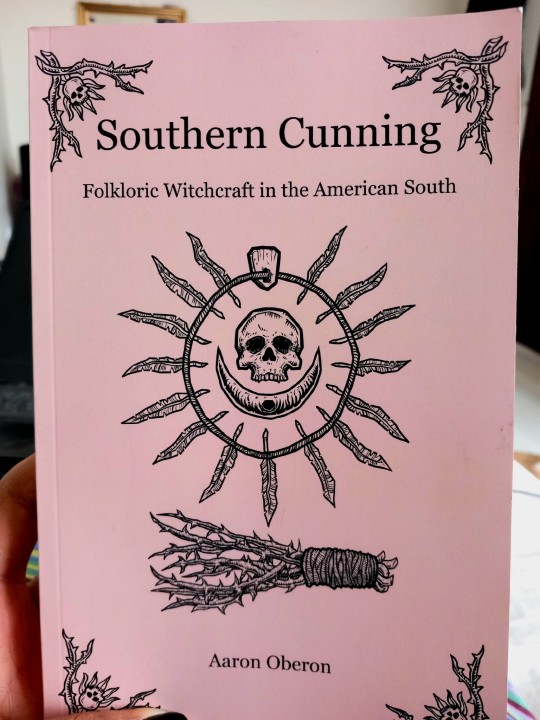
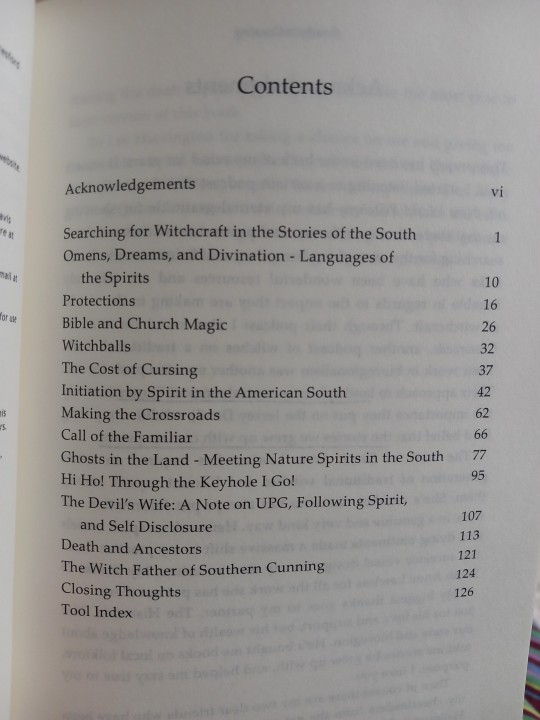
Tuesday, 28th of November
I didn't go to class today. I went to uni, stood outside for and hour and went home. I already miss my boyfriend so much :/ but I also have a lot to do for, so i can't think about him too much. My goal for today was to finish all the my research on the Uyghurs, which I didn't, but I still have some days, so I try not to panic.
One good thing is that some books y ordered arrived today, including a collection of Grimm's fairytails and Hans Christian Andersen's Fairytails 🤗
Productivity:
spent 3,5h researching for my presentation
sent an e-mail to my latin teacher
Selfcare:
Told some friends about my relationship issues
Watched a movie (Roxanne Roxanne)
Personal projects:
Copied what I had highlighted in the digital version of Southern Cunning: Folkloric Witchcraft in the American South (by Aaron Oberon) into the physical copy that arrived today
#100 days of productivity#study blog#study motivation#studyblr#studyspo#studying#student#study aesthetic
14 notes
·
View notes
Text

Walking through the picturesque streets of Cardinal Hill, you find Oberon ‘Puck’ Caldwell Thorne, the 45 year old horror/supernatural novelist originally from Cardinal Hill, WA. Living alongside them in such a small town, you know that they're perceptive and cynical, but what you might not know is that they are a human, and that they’re hiding something… ― Aaron Tveit, homosexual, man, and he/him.
biography triggers: near drowning, sibling abuse, emotional neglect

Oberon "Puck" Caldwell was born into a family of witches, a human child in a lineage steeped in supernatural heritage. From an early age, Puck felt out of place, as though he always knew that his magic would never manifest. And when it didn't, he became a curiosity in a household dominated by magic and arcane traditions. His very existence was a point of contention; while his parents celebrated the prowess of their magical lineage, Puck's mundane-ness became a source of embarrassment and confusion. His siblings liked to tell him cruel lies. He was adopted. He wasn't really their brother. His parents had found him and took him in. The worst thing they told him was that he had been a changeling, left behind while the real Caldwell baby was taken away. His siblings started calling him “Puck” -- this was cute to his parents who found it more fitting for a young boy than the elevated name of Oberon - but his parents didn't know that they meant it to be a reminder that he didn't belong.
As the years progressed, the playful teasing transformed into something far more sinister. Puck’s siblings often devised cruel pranks, the intent behind their actions always veiled in laughter. Sometimes, they'd pretend to like him and invite him along in their games only to use him as the villain, the one left behind, the one who had to sit and watch. One game nearly killed him. During the winter, when the pond froze over, they were playing a game on the ice; his brother shoved him, and Puck fell back into the area of the pond that hadn't frozen yet - the part of the pond they were supposed to stay away from. The water closed over him, and he panicked, choking on fear and water and cold. His siblings panicked and ran away.
He doesn't remember who saved him.
Even if he had told his parents, he was outnumbered. There was no guarantee that they would have believed him, as his siblings enjoyed blaming him for their misdeeds, and overall - Puck had a reputation in the family as being the black sheep.
At 16, after years of relentless bullying and emotional isolation, Puck made the decision to run away from home. After his departure, Puck visited Cardinal Hill only twice. The first visit was when he was eighteen, as his mother asked him to come home and give them another chance. It didn't last long -- he left after a month. The second visit, prompted by his parents again, was meant to be a reunion—a chance to reconnect. This is when Puck met the twins, Romeo and Rooney. However, the gathering quickly devolved into chaos, erupting in a fierce argument and vicious words being said by all sides; it was a reminder of why he had left in the first place.
Knowing he'd never be accepted, Puck left for good.
Seeking peace, Puck settled in a small town in Upstate New York, far removed from the pain of his past. He lived in a small-town on a lake, far removed from any city. It was as close to Cardinal Hill as he could get without being in the town. This place was meant for locals, it was too far removed from the highway to be easily accessible, and it didn't have much to offer for tourists -- but it gave everything to Puck.
In this environment, Puck poured his heart and soul into crafting novels that explored the darker aspects of human experience, filled with chilling narratives and a pervasive sense of dread. At twenty-six, his first published novel, The Darkwoods, gained him attention. It was a novel focusing on he the raw emotions of adolescence, the consequences of neglect, and the terrifying possibility that our darkest secrets may never truly stay buried. He gained critical praise for how he blended the supernatural with social commentary. The Darkwoods became a bestseller and finally - he found his niche.
Puck’s novels gained popularity, capturing the imagination of those who appreciated the raw pain woven into his chilling narratives. His writing style is characterized by vivid imagery and psychological depth, creating an atmosphere of unease that lingers long after the final page is turned. Puck is a prolific writer. Between the ages of 26 and 45, he has published 19 novels and 40 short stories. He's known for his consistency and output - averaging around three published works a year.
Now, at 45, Puck finds himself drawn back to Cardinal Hill, but this return is unlike any previous visits. Now, he is here to stay. Why? He won't say. He won't talk about what brought him back. While his legal name is still Oberon Caldwell, his pen-name is Oberon Thorne and it is what fans and critics alike know him by. As he navigates the familiar streets of Cardinal Hill, Puck is reminded of the family that has long ignored him and the siblings who relished in making him feel like an outcast.
3 notes
·
View notes
Text
Witchy Reading/Listening List
This is the books and podcasts I plan to enjoy soon :) I'll be doing reviews of them as I get through them! For some of these I have read/listened to them before but wish to revisit them as it has been a while.
I do not think I will realistically like all of them, and I will only review what I think I have enough of a grasp on to review faithfully. Especially for podcasts, I will probably just try out a few episodes. We shall see.
Down for recommendations if anyone has any! This will be expanded as I find new things I'd like.
Reading List - Books
Drawing Down the Moon, Margot Adler (first read)
Southern Cunning, Aaron Oberon (first read)
Recreational Witchcraft, Lyra Black (I adore this book, idk how many times read)
The Green Witch, Arin Murphy-Hiscock (I've read part of it before, but will start over from the beginning)
The Black Arts, Richard Cavendish (first read, not as witchy as much as historical [to my understanding] but figured I would add it)
Missing Witches, Risa Dickens and Amy Torok (first read)
Listening List - Podcasts
Glitch Bottle Podcast, Alexander Eth (first listen)
Comfy Cozy Witch Podcast (first listen)
3 notes
·
View notes
Text
March 2024 Reading Wrap Up
I got bronchitis and my period at the same time in March, and then spilled tea on my computer, so March was a very stressful time for me. Regardless, I managed to read 10 books! And honestly, overall, this is one of the better months - the lowest I've ranked a book is 6/10, which is damn good considering the absolute bullshit I usually read.
Religious Text
None applicable.
1/10 - Why Did They Publish This?
None applicable.
2/10 - Trash
None applicable.
3/10 - Meh
None applicable.
4 to 6/10 - Mid-Tier
Tomb Sweeping | Alexandra Chang
I read this book while sick. And boy howdy, did that make it a weird experience. I get what it was going for, but it really wasn't my vibe. It just felt like everything was...unfinished. Which was the point, I suppose, but it was still annoying.
7 to 8/10 - Good With Caveats
What the Bible Really Says about Homosexuality | Daniel A Helminiak
This is a very short book compared to my usual reads, topping at 152 pages. And I appreciate a book that gets straight to the point and analyzes the historical context around various works, particularly religious works. Good job. My only complaint is some editing issues.
Born to Love, Cursed to Feel | Samantha King
This was a poetry collection and was the only other book I read while sick, and boy howdy did I have a time of it. I spent most of the reading just...putting post-it notes in and nodding along to the lines. It was a surprisingly good book, considering I found it in the back alley version of a book store.
Southern Cunning: Folkloric Witchcraft in the American South | Aaron Oberon
Look. This is not a 101 book. It's not a 102 book. It's not even a 201 book. It simply is. And as much as I enjoyed it and enjoyed reading it, the fact that I spent most of my reading time fixing the editing means that I cannot, in good faith, put this any higher than an 8 out of 10. Dear Aaron Oberon, if you ever read this, PLEASE give me access to the original file so I can fix your punctuation and spelling mistakes. Sincerely, a fellow Southerner.
9/10 - Very Very Good
Snow White with the Red Hair, volumes 21-23 | Sorata Akiduki
I am still so fucking feral over this series. I love them so fucking much. I want them all to be happy but I also like seeing their shenanigans. Unfortunately, though we're at 26 published volumes, we've reached the end of the ones in Missouri Evergreen that I may access. I'll either have to wait and hope that someone gets them, or I'll have to bite the bullet and buy them myself.
Not Pounded By Anything: Six Platonic Tales Of Non-Sexual Encounters | Chuck Tingle
This is my first expedition into the erotic Tingleverse after reading some pieces of the horror Tingleverse in Straight and Camp Damascus. And I really, really like this book. It's 77 pages and is such an easy read. Godspeed, you glorious bastard.
10/10 - Unironically Recommend To Everyone
Well, everyone who's into the genre these fall under, at least.
Writing Fiction: A Guide to Narrative Craft, tenth edition | Janet Burroway
I found this in the free section of a bookstore in the middle of nowhere, and let me tell you, it is now marked up one side and down the other with highlighter, because I needed it. There are so many good parts of this book that it's genuinely one I would recommend to people who are trying to figure out why their writing feels flat.
Sacred Gender: Create Trans and Nonbinary Spiritual Connections | Ariana Serpentine
First, I want to congratulate the author on what is possibly the coolest name ever.
Second, if you're an occultist, polytheist, witch, magic practitioner, or in any other way affiliated with things beyond or within mortal ken...get this book. It's making me rethink a lot of my own experiences with my craft and my religion, but in a good way.
10 notes
·
View notes